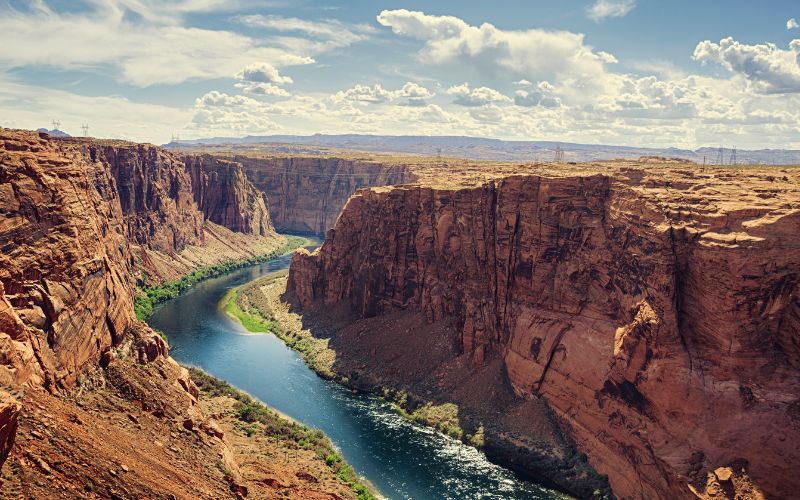
- Details
- By Kaili Berg
The Department of Interior announced a $327 million investment to continue fulfilling settlements of Indian water rights claims. The funding will support major water projects across the West to secure reliable water supplies for Tribes.
The funding comes from the Bipartisan Infrastructure Law and the Reclamation Water Settlements Fund through President Biden’s Investing in America agenda.
"Through the President’s Investing in America agenda, the Interior Department is continuing to uphold our trust responsibilities and ensure that Tribal communities receive the water resources they have long been promised,” Secretary Deb Haaland said in a press release.
Prior to the signing of the Bipartisan Infrastructure Law, many Indian Water Rights settlements remained underfunded. Tribes across the country have been challenged by centuries of colonization and resource exploitation, resulting in large cities siphoning water from their reservations.
“Reliable water is crucial to ensuring the health, safety and empowerment of Indigenous communities. I am grateful that Tribes, some of whom have been waiting for this funding for decades, are finally getting the resources they are owed,” Haaland said.
More than $100 million will go towards the Navajo-Gallup Water Supply project in New Mexico, a major infrastructure project that will provide reliable water supply from the San Juan River to the Navajo Nation via pipeline. The water supply will meet the future population needs of approximately 250,000 people.
The Navajo Nation has for years been locked in contentious negotiations with the state of Arizona to secure water from the Colorado River Basin, which provides water for 30 million people. In June, the US Supreme Court ruled against the tribe in Arizona v. Navajo Nation, determining that the federal government is not obligated to help the Navajo Nation access water from the Colorado River. The court's decision arrived during the Colorado River Basin’s worst drought in 1,200 years.
Approximately 30 percent of homes in the Navajo Nation lack running water and must drive for miles to refill barrels and jugs for drinking, cooking, and bathing. The lack of domestic water supply also impedes the economic development of the Tribe.
For the 2024 fiscal year, the following settlements and projects will get funds:
- Navajo-Gallup Water Supply Project ($164,000,000)
- Aamodt Litigation Settlement ($69,100,000)
- Blackfeet Water Rights Settlement ($35,790,000)
- Ak-Chin Indian Water Community Rights Act ($22,500,000)
- Crow Tribe Water Rights Settlement ($12,772,000)
- Southern Arizona Water Rights Settlement – Farm Extension ($9,000,000)
- Nez Perce Settlement ($6,100,000)
- Animas-La Plata Project (Colorado Ute) ($3,400,000)
- Navajo-Gallup O&M ($2,000,000)
- San Carlos Apache Tribe – Distribution System ($1,500,000)
- San Carlos Irrigation Project Rehab ($400,000)
More Stories Like This
Native News Weekly (August 25, 2024): D.C. BriefsUS Presidents in Their Own Words Concerning American Indians
Indigenous Actor Elaine Miles Reports Detention by Alleged ICE Agents
Happy Thanksgiving from Native News Online
Coming Up on Native Bidaské: Behind the Animation: Joey Clift Talks “Pow” and Native Storytelling
Help us tell the stories that could save Native languages and food traditions
At a critical moment for Indian Country, Native News Online is embarking on our most ambitious reporting project yet: "Cultivating Culture," a three-year investigation into two forces shaping Native community survival—food sovereignty and language revitalization.
The devastating impact of COVID-19 accelerated the loss of Native elders and with them, irreplaceable cultural knowledge. Yet across tribal communities, innovative leaders are fighting back, reclaiming traditional food systems and breathing new life into Native languages. These aren't just cultural preservation efforts—they're powerful pathways to community health, healing, and resilience.
Our dedicated reporting team will spend three years documenting these stories through on-the-ground reporting in 18 tribal communities, producing over 200 in-depth stories, 18 podcast episodes, and multimedia content that amplifies Indigenous voices. We'll show policymakers, funders, and allies how cultural restoration directly impacts physical and mental wellness while celebrating successful models of sovereignty and self-determination.
This isn't corporate media parachuting into Indian Country for a quick story. This is sustained, relationship-based journalism by Native reporters who understand these communities. It's "Warrior Journalism"—fearless reporting that serves the 5.5 million readers who depend on us for news that mainstream media often ignores.
We need your help right now. While we've secured partial funding, we're still $450,000 short of our three-year budget. Our immediate goal is $25,000 this month to keep this critical work moving forward—funding reporter salaries, travel to remote communities, photography, and the deep reporting these stories deserve.
Every dollar directly supports Indigenous journalists telling Indigenous stories. Whether it's $5 or $50, your contribution ensures these vital narratives of resilience, innovation, and hope don't disappear into silence.
 The stakes couldn't be higher. Native languages are being lost at an alarming rate. Food insecurity plagues many tribal communities. But solutions are emerging, and these stories need to be told.
The stakes couldn't be higher. Native languages are being lost at an alarming rate. Food insecurity plagues many tribal communities. But solutions are emerging, and these stories need to be told.
Support independent Native journalism. Fund the stories that matter.
Levi Rickert (Potawatomi), Editor & Publisher

